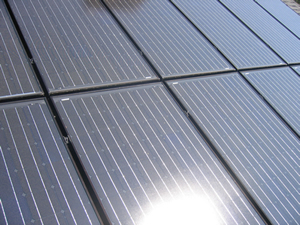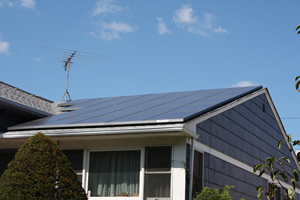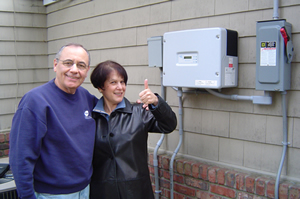 There are many ways in which you can tap the sun as an energy source. You can use the sun’s rays to heat things – such as the water for you home – through solar thermal energy. You can use solar energy to turn light from the sun directly into electricity using photovoltaics, or “PV.” Two other ways include daylighting, which is the practice of using natural light to illuminate indoor spaces, and passive solar space heating, which captures the sun’s heat within the building’s elements and releases that heat during periods when the sun is not shining. There are many ways in which you can tap the sun as an energy source. You can use the sun’s rays to heat things – such as the water for you home – through solar thermal energy. You can use solar energy to turn light from the sun directly into electricity using photovoltaics, or “PV.” Two other ways include daylighting, which is the practice of using natural light to illuminate indoor spaces, and passive solar space heating, which captures the sun’s heat within the building’s elements and releases that heat during periods when the sun is not shining.
The most common solar energy installations used for homes are solar electric systems (PV) and solar hot water heaters.
Benefits to homeowners, the community and environment
Solar Hot Water Systems:
Solar hot water systems can be a cost-effective way to generate hot water for your home. Due to the cold winters, homeowners in Nassau County should use an “active” and “closed loop” solar hot water system. Active systems use electric pumps to circulate a fluid with a low freezing point through specially-designed collector panels on your roof. The fluid is heated by the sunlight as it passes through the collector panels and then directed to a heat transfer unit where it warms the cool water heading into your household hot water tank. The “closed loop” means that the special fluid then returns to the pump and again flows into the solar collector on your roof without ever mixing with your home’s water.
Steps to getting a solar hot water system
Solar Electric Systems:
 If you ever used a solar calculator back when you were in school, you've seen solar electric technology in action. But that technology has come a long way, and now solar electric systems can provide clean and safe electricity for your home. Solar panels are installed on a southern-exposed roof to maximize their sun exposure, and they convert sunlight into direct current (DC) electricity. The panels then route power through an inverter to convert it into alternating current (AC) electricity and distribute the power throughout your home. Solar electric systems are durable: typical PV systems have 25-year warranties and may last 40 years with minimal maintenance. If you ever used a solar calculator back when you were in school, you've seen solar electric technology in action. But that technology has come a long way, and now solar electric systems can provide clean and safe electricity for your home. Solar panels are installed on a southern-exposed roof to maximize their sun exposure, and they convert sunlight into direct current (DC) electricity. The panels then route power through an inverter to convert it into alternating current (AC) electricity and distribute the power throughout your home. Solar electric systems are durable: typical PV systems have 25-year warranties and may last 40 years with minimal maintenance.
In some cases, your solar electric system may generate more electricity than you’re using. In New York, residential utility customers with installed solar electric systems of  up to 25 kilowatts may “net meter,” meaning that they may receive credit for the electricity that they generate. When your system is producing more electricity than you are consuming, the electrical meter spins backward because you are sending your excess electricity to the grid. Net metering allows you to see direct benefits from your solar electric system through lower electric bills, and shortens the payback time for your solar system installation. up to 25 kilowatts may “net meter,” meaning that they may receive credit for the electricity that they generate. When your system is producing more electricity than you are consuming, the electrical meter spins backward because you are sending your excess electricity to the grid. Net metering allows you to see direct benefits from your solar electric system through lower electric bills, and shortens the payback time for your solar system installation.
Steps to getting a solar electric system |